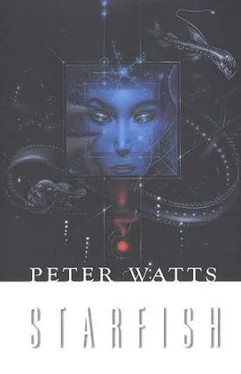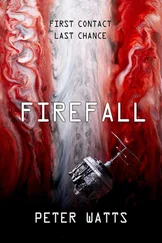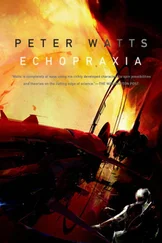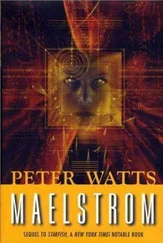Peter Watts - Starfish
Здесь есть возможность читать онлайн «Peter Watts - Starfish» весь текст электронной книги совершенно бесплатно (целиком полную версию без сокращений). В некоторых случаях можно слушать аудио, скачать через торрент в формате fb2 и присутствует краткое содержание. Год выпуска: 1999, Жанр: Фантастика и фэнтези, на английском языке. Описание произведения, (предисловие) а так же отзывы посетителей доступны на портале библиотеки ЛибКат.
- Название:Starfish
- Автор:
- Жанр:
- Год:1999
- ISBN:нет данных
- Рейтинг книги:3 / 5. Голосов: 1
-
Избранное:Добавить в избранное
- Отзывы:
-
Ваша оценка:
- 60
- 1
- 2
- 3
- 4
- 5
Starfish: краткое содержание, описание и аннотация
Предлагаем к чтению аннотацию, описание, краткое содержание или предисловие (зависит от того, что написал сам автор книги «Starfish»). Если вы не нашли необходимую информацию о книге — напишите в комментариях, мы постараемся отыскать её.
Starfish — читать онлайн бесплатно полную книгу (весь текст) целиком
Ниже представлен текст книги, разбитый по страницам. Система сохранения места последней прочитанной страницы, позволяет с удобством читать онлайн бесплатно книгу «Starfish», без необходимости каждый раз заново искать на чём Вы остановились. Поставьте закладку, и сможете в любой момент перейти на страницу, на которой закончили чтение.
Интервал:
Закладка:
But vampires were damaged goods, always had been. That was the whole point. How could Yves Scanlon qualify for membership in a club like that ?
He knew one thing, though. He'd rather be a vampire than one of these assholes up here . That was obvious now. Now that the pretenses were dropping away and they didn't even bother talking to him any more. They exploited him and then they shunned him, they used him just like they used the vampires. He'd always known that deep down, of course. But he'd tried to deny it, kept it stifled under years of accommodation and good intentions and misguided efforts to fit in.
These people were the enemy. They'd always been the enemy.
And they had him by the balls.
He spun around and slammed his fist into the examination table. It didn't even hurt. He continued until it did. Panting, knuckles raw and stinging, he looked around for something else to smash.
The teleop woke up enough to hiss and spark when the chair bounced off its central trunk. One of the arms wiggled spastically for a moment. A faint smell of burnt insulation. Then nothing. Only slightly dented, the teleop slept on above a litter of broken paradigms.
"Tip for the day," Scanlon snarled at it. "Never trust a dryback."
Head Cheese
Theme and Variation
A tremor shivers through bedrock. The emerald grid fractures into a jagged spiderweb. Strands of laser light bounce haphazardly into the abyss.
From somewhere within the carousel, a subtle discontent. Intensified cogitation. The displaced beams waver, begin realigning themselves.
Lenie Clarke has seen and felt all of this before. This time she watches the prisms on the seabed, rotating and adjusting themselves like tiny radio-telescopes. One by one the disturbed beams lie back down, parallel, perpendicular, planar. Within seconds the grid is completely restored.
Emotionless satisfaction. Cold alien thoughts nearby, reverting.
And further away, something else coming closer. Thin and hungry, like a faint reedy howl in Clarke's mind…
"Ah, shit," Brander buzzes, diving for the bottom.
It streaks down from the darkness overhead, mindlessly singleminded, big as Clarke and Brander put together. Its eyes reflect the glow from the seabed. It slams into the top of the carousel, mouth open, bounces away with half its teeth broken.
It has no thoughts, but Lenie Clarke can feel its emotions. They don't change. Injury never seems to faze these monsters. Its next attack targets one of the lasers. It skids around the roof of the carousel and comes up from underneath, swallowing one of the beams. It rams the emitter, and thrashes.
A sudden vicarious tingle shoots along Clarke's spine. The creature sinks, twitching. Clarke feels it die before it touches bottom.
"Jesus," she says. "You sure the laser didn't do that?"
"No. Way too weak," Brander tells her. "Didn't you feel it? An electric shock?"
She nods.
"Hey," Brander realizes. "You haven't seen this before, have you?"
"No. Alice told me about it, though."
"The lasers lure them in sometimes, when they wobble."
Clarke eyes the carcass. Neurons hiss faintly inside it. The body's dead, but it can take hours for the cells to run down.
She glances back at the machinery that killed them. "Lucky none of us touched that thing," she buzzes.
"I was keeping my distance anyway. Lubin said it wasn't hot enough to be dangerous, but, well…"
"I was tuned in to the gel, when it happened," she says. "I don't think it—"
"The gel never even notices. I don't think it's hooked into the defense system." Brander looks up at the metal structure. "No, our head cheese has far too much on its mind to waste its time worrying about fish."
She looks at him. "You know what it is, don't you?"
"I don't know. Maybe."
"Well?"
"I said I don't know. Just got some ideas."
"Come on, Mike. If you've got ideas, it's only because the rest of us have been out here taking notes for the past two weeks. Give."
He floats above her, looking down. "Okay," he says at last. "Let me just dump what you got today and run it against the rest. Then, if it pans out…"
"About time." Clarke grabs her squid off the bottom and tweaks the throttle. "Good."
Brander shakes his head. "I don't think so. Not at all."
"Okay, then. Smart gels are especially suited for coping with rapid changes in topography, right?"
Brander sits at the library. In front of him, one of the flatscreens cycles through a holding pattern. Behind, Clarke and Lubin and Nakata do the same.
"So there are two ways for your topographic environment to change rapidly," he continues. "One, you move quickly through complex surroundings. That's why we're getting gels in muckrakers and ATVs these days. Or you could sit still, and let your surroundings change."
He looks around. Nobody says anything. "Well?"
"So it's thinking about earthquakes," Lubin remarks. "The GA told us that much."
Brander turns back to the console. "Not just any earthquake," he says, a sudden edge in his voice. "The same earthquake. Over and over again."
He touches an icon on the screen. The display rearranges itself into a pair of axes, x and y. Emerald script glows adjacent to each line. Clarke leans forward: time , says the abscissa. Activity , says the ordinate.
A line begins to crawl left to right across the display.
"This is a mean composite plot of every time we ever watched that thing," Brander explains. "I tried to pin some sort of units onto the y-axis, but of course all we can tune in is now it's thinking hard, or now it's slacking off . So you'll have to settle for a relative scale. What you're seeing now is just baseline activity."
The line shoots about a quarter of the way up the scale, flattens out.
"Here it's started thinking about something. I can't correlate this to any real events like local tremors, it just seems to start on its own. An internally-generated loop, I think."
"Simulation," Lubin grunts.
"So it's thinking along like this for a while," Brander continues, ignoring him, "and then, voila …" Another jump, to halfway up the y-axis. The line holds its new altitude for a few pixels, slides into a gentle decline for a pixel or two, then jumps again. "So here it started thinking quite hard, starts to relax, then starts thinking even harder." Another, smaller jump, another gradual decline. "Here it's even more lost in thought, but it takes a nice long break afterwards." Sure enough, the decline continues uninterrupted for almost thirty seconds.
"And right about now …"
The line shoots almost to the top of the scale, fluctuates near the top of the graph. "And here it just about gives itself a hemorrhage. It goes on for a while, then—"
The line plummets vertically.
"— drops right back to baseline. Then there's some minor noise, I think it's storing its results or updating its files or something, and the whole thing starts all over again." Brander leans back in his chair, regards the rest with his hands clasped behind his head. "That's all it's been doing. As long as we've been watching it. The whole cycle takes about fifteen minutes, give or take."
"That's it?" Lubin says.
"Some interesting variations, but that's the basic pattern."
"So what does it mean?" Clarke asks.
Brander leans forward again, towards the library. "Suppose you were an earthquake tremor, starting here on the rift and propagating east. Guess how many faults you'd have to cross to get to the mainland."
Lubin nods and says nothing.
Clarke eyes the graph, guesses: five .
Читать дальшеИнтервал:
Закладка:
Похожие книги на «Starfish»
Представляем Вашему вниманию похожие книги на «Starfish» списком для выбора. Мы отобрали схожую по названию и смыслу литературу в надежде предоставить читателям больше вариантов отыскать новые, интересные, ещё непрочитанные произведения.
Обсуждение, отзывы о книге «Starfish» и просто собственные мнения читателей. Оставьте ваши комментарии, напишите, что Вы думаете о произведении, его смысле или главных героях. Укажите что конкретно понравилось, а что нет, и почему Вы так считаете.








